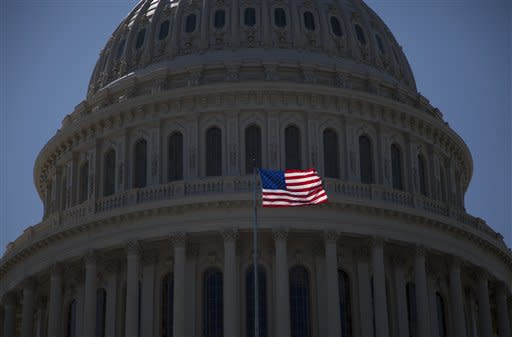 The Ticket
The TicketMeet the new Super Congress

Now that Congress has agreed on a general framework to raise the debt ceiling, party leaders will establish a bipartisan committee of lawmakers from both chambers to hash out the finer details.
Under the new law, the federal government will cap spending levels by about $1 trillion over a ten-year period and delegate the responsibility of slashing another $1-$2 trillion to a powerful 12-member committee.
No, it's not the Gang of Six (times two). This time it's called the "Super Congress."
The committee of six Republicans and six Democrats, which will do most of its work behind closed doors, will have until Nov. 23 to develop a plan to reduce the budget deficit that must pass through both Houses of Congress before Christmas.
Once they come up with a plan that seven members agree to, it will go to both chambers and can pass with just a simple majority. No filibustering, and no amending allowed.
If, however, they fail to find agreement, there's a back-up plan: Under the new law, Congress has set a series of "triggers," which will automatically reduce spending levels across the board if the group cannot get the job done. If the negotiations fall through, billions in cuts to both discretionary spending and the defense budget will automatically kick in, giving neither party a say about the details.
The negotiations, of course, are not expected to be easy. Democrats are demanding that tax increases be included in the committee's plan, a proposal Republicans still refuse to consider.
"Everything is on the table for that committee," said White House Press Secretary Jay Carney. "Entitlement reform and tax reform. And let's be clear, the president thinks that the biggest possible overall accomplishment, in terms of deficit reduction, is a desirable goal, as long as it's balanced."
For conservative Republicans and liberal Democrats alike, there remains much skepticism about the group's ability to find a sound solution.
On the right, the worry remains that Democrats will successfully convince one Republican to join them in raising taxes.
"The framework of 'triggers' and a new 12-member House-Senate committee opens the door to dangerous national security cuts and raises the possibility that six Democrats and one misguided Republican could rush tax increases to the House and Senate floors," said Ohio Republican Rep. Jim Jordan, chairman of the conservative Republican Study Committee.
The left has similar concerns, as they brace for even more cuts to programs that aid the poor without raising taxes on the wealthy.
And who will sit on this all-powerful committee? The details of the Super Congress' membership are still pending. Since this small group will likely determine the details of federal government's budget for the next ten years, each opening will no doubt become a coveted post on Capitol Hill.

